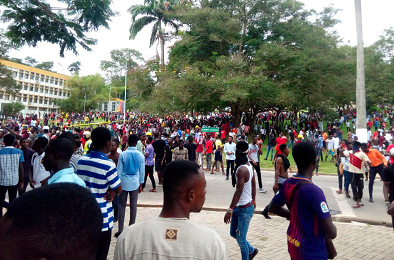
Aluta continua!!
There was a time in this country, particularly in the 1970s and 1980s, when student agitations, or ‘aluta’, were almost a rite of passage for every university student.
My earliest recollection of aluta was during General I.K Acheampong’s tenure as head of state, when his government proposed the rather absurd notion of Union Government (or Unigov) as an alternative to military rule.
The professional classes and the labour unions, among others, joined students in protesting this idea in the run-up to the March 1978 referendum on Unigov.
It is probably safe to argue that this was one of the factors that led to the head of state being deposed in a bloodless palace coup four months later.
Later on, in the 1980s, the Jerry Rawlings revolution had its own taste of students’ ire when their rosy, blossoming love affair turned sour.
The introduction of user fees in the 1990s really riled students, and when KNUST decided to convert the hitherto male hall of Republic Hall to mixed status, campus erupted.
In quite a number of instances, universities were closed down for up to a year, causing great anguish to students, parents and the universities.
Experience
My first real experience of aluta was when I was in Lower Six, sometime in 1986. Students had issues with the school administration, the details of which are foggy, three decades on.
But it blew into a full-scale aluta, and students decided to march to town and express their grievances. We demanded the removal of the headmaster.
The then Catholic Bishop of Kumasi, Bishop Kwasi Sarpong, tried to talk us out of going to town, but we swept his pleas aside and hit the streets, screaming our teenage lungs out and marching to Manhyia Palace to present our petition to Otumfuo Opoku Ware II, the then Asantehene.
I remember being one of the students allowed to enter the palace to present our petition and grievances to Otumfuo. We returned to campus feeling accomplished.
Incidents
Last week’s incidents at the Kwame Nkrumah University of Science and Technology (KNUST) brought my aluta credentials to my mind. It became clear to me that there was a clear breakdown in communication and dialogue between management and the students.
Students in particular felt the university security apparatus had turned itself into a Gestapo unit, unleashing terror and violence on students at the very slightest provocation, which made them feel as if they lived in a police state.
They felt it was unfair for their SRC and faculty students’ accounts to be hijacked by the authorities, depriving them of even being co-signatories to those accounts and for their JCR leaders who led the court action against the university over the mixed hall saga to be stripped of their positions and those positions handed over to first-year students in clear breach of their hall constitutions. Other issues such as a ban on ‘morale’ also went down badly, and they felt the Vice Chancellor and his team were treating them like senior high school students.
They, however, stated that the hall conversion was not an issue for them.
On the part of the management, they felt that student hooliganism and violence were getting out of control and there was a need to maintain discipline and ensure that campus was conducive to learning.
They cited bloody clashes between Unity and Katanga Hall students sometime ago and the petrol bombing of the female wing of Katanga, among others, as evidence.
Underlying issue
Whatever the veracity of either side’s claims, what is not in dispute is that a climate of distrust and suspicion prevailed on campus, and many issues had simmered for a while, leading to resentment particularly among students.
Listening to one of the University Relations officers on radio referring to students as ‘kids’, I could not help but wonder whether this was actually the underlying issue, that the authorities treated students as children who needed to be disciplined and who had no say in the discipline process.
I would support students’ right to demonstrate any day, over whatever it is that eats them, but a red line ought to be drawn in the sand over the destruction of property in the protests, because it achieves nothing, except attract public condemnation.
It is possible to engage in a peaceful, impacting protest without the need to descend into chaos and violence, and to that extent, I believe the destruction stands condemned without reservation.
I also believe the university ought to take a long, hard look at how it ensures discipline is maintained on campus and students do not engage in dangerous, foolish behaviour.
Of course every community has rules and those rules need to be enforced to ensure civility, but perhaps it needs to re-orient its internal security apparatus and get them trained on emotional intelligence rather than boot-stomping and whip-cracking in their attempt to ensure compliance with campus rules.
Violence / brutality visited upon the students is unacceptable and crude.
One can only hope that in the wake of the issues over the dissolution of the university council, the constitution of an interim council and the positions taken by various groups in respect of this, the university will be the ultimate beneficiary and that as soon as possible, school is reopened and normalcy returns to facilitate academic work.
By all means let aluta flourish if and when the need arises on school campuses and beyond, but let us hope that they will be few and far between because dialogue will prevail to avert the need.
I am too old to go on any aluta march for whatever reason, because my energy and testosterone levels have dropped over the years and my knees are not what they used to be anyway.
The struggle continues in my mind.
By Rodney Nkrumah-Boateng (
